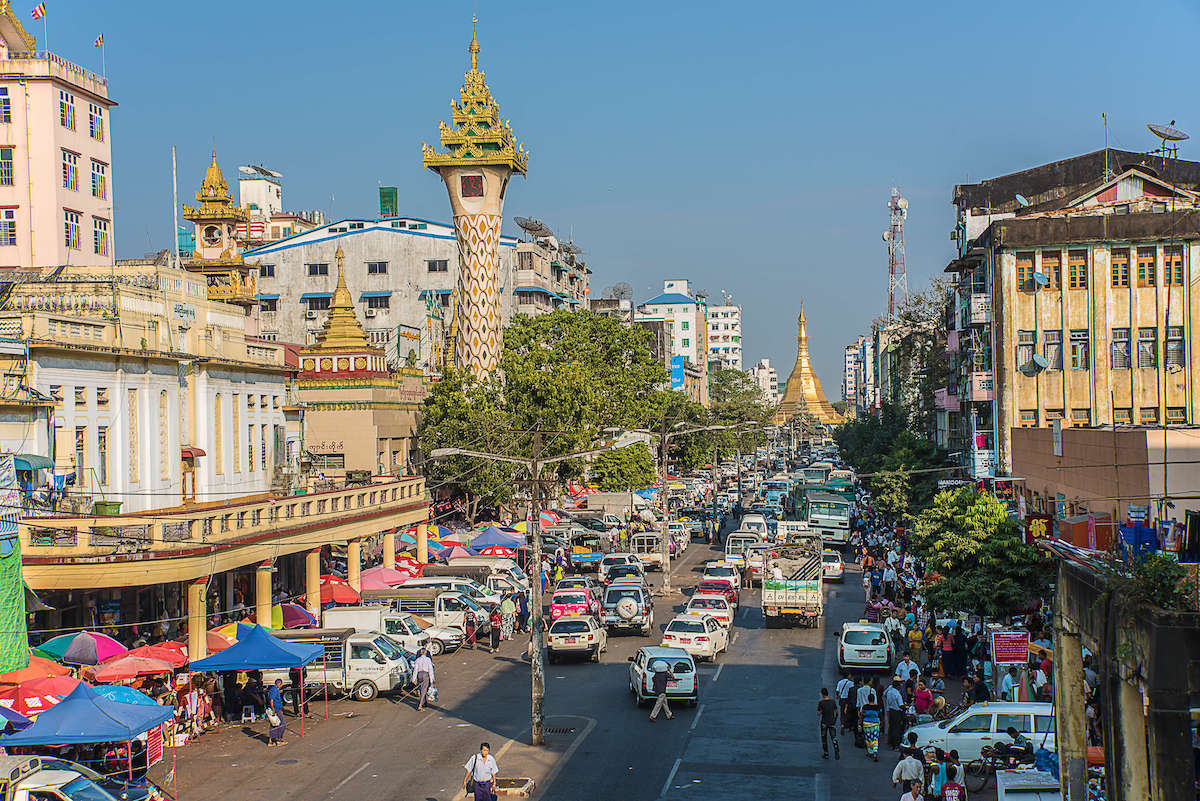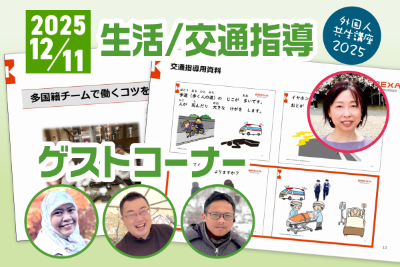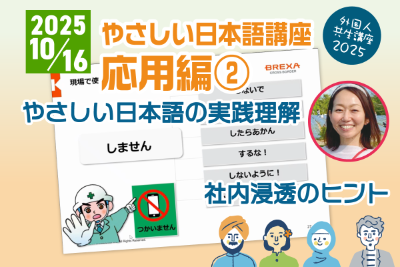- やさしい日本語
- ひらがなをつける
- Language
We provide multilingual content through machine translation. Translation accuracy is not 100%. About the multilingualization of the JAC website
- About JAC
- JAC Membership Information
- Specified Skilled Worker Acceptance
- Specified Skilled Worker Overview of the system
- 10 Mandatory Assistance for Foreigners
- Online individual consultation
- Seminar on Coexistence with Foreign Nationals
- Leading examples of host companies
- Case studies collection "Visionista"
- Foreigner's Voice
- Foreign Resident Acceptance Manual / Q&A
- Useful column "JAC Magazine"
- Acceptance support services
- Specified Skills Acceptance Support Service
- Skills improvement support
- Online Special Education
- Skill training
- Japanese Language Course
- Education and Training Support
- Subsidy system for obtaining qualifications
- Support for creating a comfortable workplace
- Temporary Return Support
- CCUS charge support
- Support system for promoting the accumulation of employment history
- Post-acceptance training
- Compensation system for Specified Skilled Worker (i)
- Daily life support
- Medical interpretation support
- Support for daily life problems
- freeJob matching
- The Specified Skills Evaluation Exam
- Home
- JAC Magazine
- Working with foreign workers
- What is the status of residence that allows you to work? Explaining the types, how to obtain it, and more!
- Home
- JAC Magazine
- Working with foreign workers
- What is the status of residence that allows you to work? Explaining the types, how to obtain it, and more!

What is the status of residence that allows you to work? Explaining the types, how to obtain it, and more!
I wrote the article!
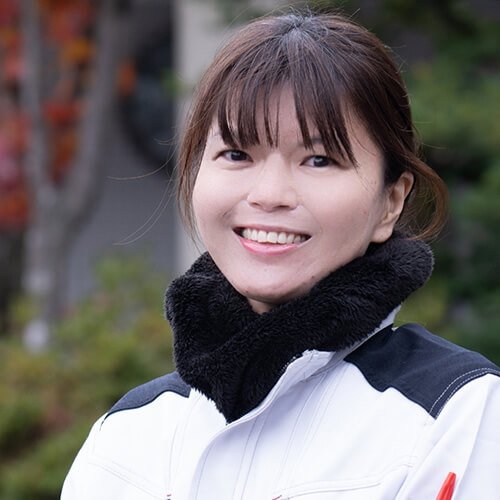
(One company) Japan Association for Construction Human Resources
Chief of Research and Development Department / Administration Department / Public Relations Department
Motoko Kano
(Kano Motoko)
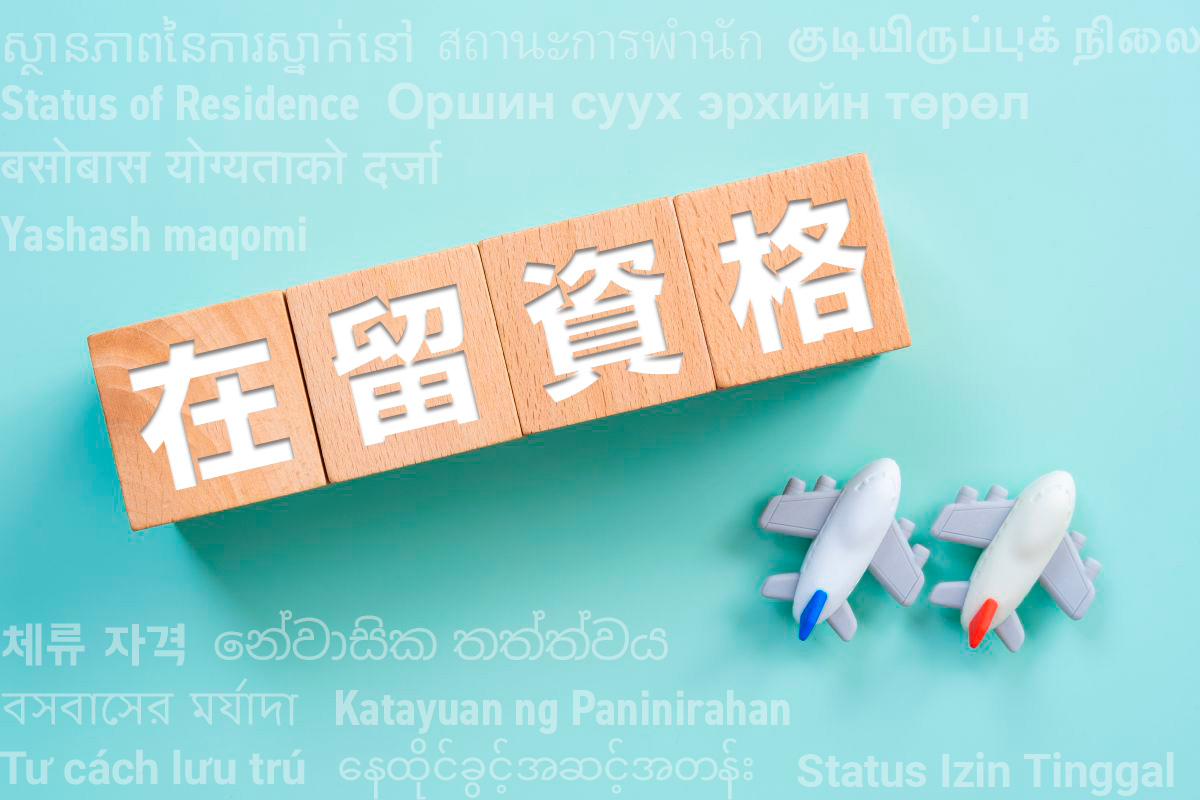
Hello, this is Kano from JAC (Japan Association for Construction Human Resources).
Foreigners need a status of residence to work in Japan.
However, there are also visas (visas) that are sometimes confused with similar concepts, and there are some points that are difficult to understand.
Therefore, this time, I would like to take a look at the status of residence that allows you to work.
We will also introduce the differences from visas, types of status of residence, and how to obtain a status of residence, so please refer to it.
What is residence status?
A status of residence is a qualification that allows you to reside in Japan and engage in certain activities.
Foreigners need a residence status to work in Japan.
On the other hand, a visa is considered to be a kind of letter of recommendation that is required for foreigners to enter Japan.
Although "visa" and "residence status" are actually different things, they are generally used with the same meaning, and a "residence status" for the purpose of working is sometimes called a "work visa."
What type of residence status do you have?
In Japan, depending on how you count, there are approximately 29 types of residence status.
The work that can be done and the period of stay vary depending on the status of residence.
Status of residence for the purpose of working
The status of residence for the purpose of working is as follows:
Specified Skills (Specified Skilled Worker (i) ・No. 2)
Specified Skills is a residency status that allows you to work as a workforce in Specified Industry Fields with labor shortages.
There are two types of Specified Skills, Specified Skilled Worker (i) and Specified Skilled Worker (ii), and they differ in the industries in which they can work.
- Specified Skilled Worker (i):16 fields
- Specified Skilled Worker (ii): 11 fields (excluding nursing care, Automobile transportation business, railways, forestry, and Wood industry of the 16 fields in No. 1)
In addition, the period of stay of Specified Skilled Worker (i) is a total of 5 years, and in principle, it cannot be extended further.
On the other hand, Specified Skilled Worker (ii) has no upper limit on the renewal of the period of stay.
Family members are also allowed to be brought with them, and they can continue to stay in Japan as long as they continue to renew.
Learn more about the differences between Specified Skilled Worker (i) and Specified Skilled Worker (ii) here.
What is Specified Skilled Worker (ii)? Introducing the differences from No. 1 and how to obtain it
"Designated Activities for the purpose of transitioning to Specified Skills (June, work permitted)"
If you wish to change from another status of residence to a "Specified Skilled Worker (i)" status of residence, but it takes some time to prepare for the transition, you can change your status of residence to "Designated Activities (June, work is possible)", which allows you to prepare while working at Accepting Organizations.
The period of stay is 6 months for applications made after January 9, 2024 (previously 4 months).
Renewal is a one-time renewal and requires unavoidable circumstances.
Technical Intern Training
This status of residence is established for the purpose of learning skills and transferring technology to your home country.
You can work in a wide range of fields in 90 occupations, including agriculture, fisheries, construction, food manufacturing, textiles and clothing, and machinery and metals.
Technical Intern Training status of residence is divided into Technical Intern Training stages (No. 1~3) and by single type or group supervision type, and each is a separate status of residence.
With the Technical Intern Training status of residence, you can stay in Japan for a total of 5 years if you add up from 1 to 3.
You can also migrate from Technical Intern Training to Specified Skills.
The following column explains it in detail, so please take a look at it as well.
The 10 differences between Specified Skills and Technical Intern Training. Know the advantages and precautions before considering them.
Technology, Humanities, and International Business (Gijinkoku)
Regardless of whether you are in the sciences or humanities, you can work in a position that makes use of your specialized knowledge.
- Technology (engineers, research and development, etc.)
- Humanities (law, etc.)
- International business (interpretation, translation, overseas transactions, etc.)
The period of stay is 5 years, 3 years, 1 year, or 3 months.
nursing care
This is a status of residence that can be obtained by those who are registered as care workers.
Able to handle all aspects of nursing care.
The period of stay is 5 years, 3 years, 1 year, or 3 months.
Intra-company transfer
This is a status of residence for employees who are transferred to Japan from an overseas branch of the same company.
The work permitted for intra-company transfers is the same as that for "Engineer/Specialist in Humanities/International Services."
The period of stay is 5 years, 3 years, 1 year, or 3 months.
business administration
This is a status of residence that allows foreigners to establish and manage a company.
The industry is wide-ranging, and any industry recognized as legally appropriate in Japan is acceptable.
The period of stay is 5 years, 3 years, 1 year, 6 months, 4 months, or 3 months.
Skills
This is a status of residence for craftsmen with specific skills.
Examples include chefs of foreign cuisine, pilots, and sports instructors.
The period of stay is 5 years, 3 years, 1 year, or 3 months.
performance
This is a residence status for foreign artists and athletes.
The period of stay is 3 years, 1 year, 6 months, 3 months, or 15 days.
education
This is a residence status for elementary, junior high, and high school teachers.
The period of stay is 5 years, 3 years, 1 year, or 3 months.
the study
This is a status of residence for researchers and investigators at research institutions.
The period of stay is 5 years, 3 years, 1 year, or 3 months.
medical care
This is a status of residence for doctors, dentists, pharmacists, nurses, etc. who hold Japanese qualifications.
The period of stay is 5 years, 3 years, 1 year, or 3 months.
art
This is a status of residence for those working in the arts, such as composers and painters.
The period of stay is 5 years, 3 years, 1 year, or 3 months.
religion
This is a residence status for religious workers such as monks and missionaries.
The period of stay is 5 years, 3 years, 1 year, or 3 months.
press
This is a residence status for newspaper reporters, magazine reporters, editors, photojournalists, announcers, etc.
The period of stay is 5 years, 3 years, 1 year, or 3 months.
Legal and accounting services
This is a status of residence for Japanese qualified lawyers, judicial scriveners, certified public accountants, tax accountants, etc.
The period of stay is 5 years, 3 years, 1 year, or 3 months.
professor
This is a status of residence for working as a university professor, assistant professor, assistant, etc.
The period of stay is 5 years, 3 years, 1 year, or 3 months.
A status of residence that does not permit working in Japan
As a general rule, those with the following residence statuses are not permitted to work.
However, if you are granted permission to engage in activities outside of your status of residence, you may be able to work within the scope of that permission.
- Study abroad: International students at Japanese universities, students at Japanese language institutions, etc.
- Family stay: Spouse or child supported by a long-term foreign resident
- Short-term stay: sightseeing purposes, etc.
- Cultural activities: Unpaid research into Japanese culture, etc.
- Training: When participating in training conducted by the Japanese government, etc.
The process for obtaining a status of residence

We will introduce the process for obtaining a status of residence.
Basic application method for residence status
There are two main procedures for obtaining a status of residence:
- New application (application for Certificate of Eligibility)
- Application for change (application for permission to change status of residence)
Below we will introduce the basic steps for each application.
① New application
This is an application for those who wish to obtain a new residence status, such as those coming to Japan from overseas to work.
The application process is as follows:
- The accepting company applies for a Certificate of Eligibility to the Regional Immigration Bureau (1-3 months)
- Issuance of certification certificate
- The foreign national applies for a visa at a Japanese diplomatic mission overseas (it will be issued within five business days from the day after the application is accepted).
- Enter Japan (generally within three months of the date of issue) and receive your residence card
The required documents vary depending on the status of residence.
② Change application
This is an application to change your residence status from "Student" to "Engineer/Specialist in Humanities/International Services", etc.
The application process is as follows:
- Apply at a regional immigration office (prepare the necessary documents)
- Receive your residence card at the regional immigration office
Summary: When foreigners work in Japan, they need a residence status that suits their type of work.
You need a status of residence to work in Japan.
Each status of residence has different duties and periods of stay.
The method of obtaining a status of residence is different depending on whether you acquire a new status of residence or change from another status of residence.
For corporate support regarding the acceptance of Specified Skilled Worker in the construction industry, please feel free to contact JAC!
We also introduce Specified Skilled Worker.
*This column is based on information as of February 2025.
The author of this article

(One company) Japan Association for Construction Human Resources
Chief of Research and Development Department / Administration Department / Public Relations Department
Motoko Kano
(Kano Motoko)
Born in Aichi Prefecture.
He is in charge of public relations, research and investigation, and is the person behind social media.
We update our social media accounts daily with the desire to make people fall in love with Japan, to spread the appeal of construction from Japan to the world, and to ensure that Japan's construction industry continues to be the industry of choice around the world.
He is also engaged in research into the feasibility of implementing skills evaluation exam in Asian countries, and is conducting interviews with local organizations in each country.
Related articles

What is the Japanese level of Specified Skilled Worker? Precautions and measures after acceptance

Things to know when working with Muslim employees in a Japanese company

What is the obligation to notify the employment status of foreigners? Foreign workers who must be notified and how to apply

Can foreigners with "Engineer/Specialist in Humanities/International Services" status of residence be employed in the construction industry?






